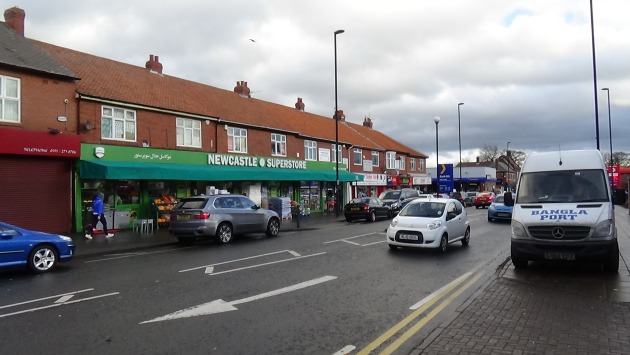
It was an obvious choice really. I want to write poems for as many different people as I can and, it’s fair to say, there’s a lot of different people in Fenham. A walk down the West Road boasts an impressive mix of cultures and services: African hair shops, Polish supermarkets, Lebanese restaurants, Hindu temples- all side by side, stretching off endlessly into the distance. There’s people living here from all over the world, particularly India and Pakistan. But it’s also an area with a bit of a bad reputation. I work with a girl called Emily who grew up in Fenham.
“You’ll get stabbed,” she said, when I told her I was going. Even my level-headed friend, Ellen, admitted that Fenham was the only place in Newcastle she was afraid of.
And there were other reasons why this might not be straightforward. I was told a few times that it would be hard to find an English speaker. Back in June, I chatted to a man called Matt, who can often be seen wearing multi-coloured, hemp-based clothing and playing the djembe in the city centre. He knows the area well and recommended I go on a Saturday.
“Usually, the husband is the person who speaks English. They answer the door and, if they’re at work, the wife’s told not to answer.” Matt also mentioned that some of his friends from Fenham were more wary of talking to strangers after Brexit. A lad he played music with stopped coming out, he was worried about being attacked. It was a disturbing reminder of the times; hate crimes were reported to have gone up 60% after the referendum and I had no idea if this was going to effect what people felt about me. Just to add an extra level of pressure, Radio 4 got in touch and asked me to find at least 3 people who would be up for going on the radio. There was a lot of things here that could go wrong.
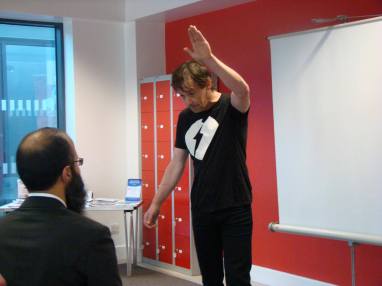 Poets Wajid Hussain and Ettrick Scott both recommended I try Wingrove Gardens. There’s a mosque there and it seemed like a good choice. The chance to chat to people from the Muslim community was pretty exciting, especially at a time when the right wing press seems bent on portraying them in the most horrible light possible. But could I make it work? I decided to go on a Saturday. I also practiced a non-Geordie, shortened version of my intro poem.* Aside from that, I decided there wasn’t much else I could do. Surely it was better to throw caution to the wind than it was to play it safe? So, on a cold December afternoon, I got on the number 12 bus and headed west.
Poets Wajid Hussain and Ettrick Scott both recommended I try Wingrove Gardens. There’s a mosque there and it seemed like a good choice. The chance to chat to people from the Muslim community was pretty exciting, especially at a time when the right wing press seems bent on portraying them in the most horrible light possible. But could I make it work? I decided to go on a Saturday. I also practiced a non-Geordie, shortened version of my intro poem.* Aside from that, I decided there wasn’t much else I could do. Surely it was better to throw caution to the wind than it was to play it safe? So, on a cold December afternoon, I got on the number 12 bus and headed west.
–
Captains’ Log 03/12/16 13:09
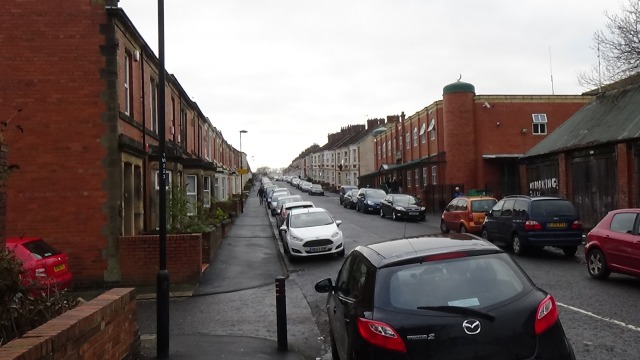
I turn on to Wingrove Gardens. I’m definitely in the right place. The mosque on the right is a bold, red-brick building with columns at all four corners; there’s a few people walking about in the street, men in thobes and topis. I’m starting to feel a bit nervous now. I tell myself not to try, trying is the only thing that causes problems. I usually start at number 1 on every street. But when I look around, I can’t see it anywhere. I see number 2 though, a big house on the corner with a white wooden door. I decide I’ll start here instead. I walk over. I take a deep breath and tap the black knocker three times. I wait. No answer. There’s no doors to the left of this house, just a row of garages with ‘No Parking’ painted on the front. There’s no doors directly across the road either. I look around and I can’t find numbers 3 to 6 anywhere. Seriously, people of Fenham, where have all these houses gone?
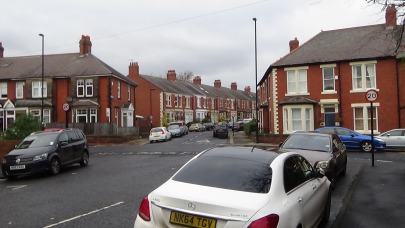 I head across the road towards number 7. I’m making some notes when a 30-odd year old man in a black puffer jacket and a shalwaar kameez walks past. I smile at him. I wonder what he’s thinking, most people assume I’m either a salesman or I’m talking about Jesus. As I’m wondering, he walks up to one of the doors and starts to head into the house.
I head across the road towards number 7. I’m making some notes when a 30-odd year old man in a black puffer jacket and a shalwaar kameez walks past. I smile at him. I wonder what he’s thinking, most people assume I’m either a salesman or I’m talking about Jesus. As I’m wondering, he walks up to one of the doors and starts to head into the house.
“Excuse me,” I say, before he’s stepped in. “I’m doing an art project, have you got a minute?”
“OK. How long will it take?” he asks.
“Just a minute.” I start doing the poem. He stops me as soon as I say I’m a Door-to-Door Poet.
“I write poetry too. It’s in Arabic though, I’m not so good at English.” This is Sam and he’s the first poet I’ve met since I started the project. This feels very special. There’s a sense of comradery here- if ever there was a man who understood how scary this feels, it’s Sam. “Have you read much Arabic poetry?” he asks.
“Only a few translations.”
“It’s quite hard to translate actually,” he says.
Sam reaches behind the front door and grabs a silver packet full of biscuits. He offers one to me. I admire the style of a man who keeps biscuits this close to the front door. They taste nice, a bit like shortbread, a hint of coconut in there. I ask him what’s important. “Well, actually, poetry. Sometimes I love someone and if I tell you how much I love them, you won’t believe it. But when I make poetry I show you.”
“So poetry can express what you feel much better?” I suggest.
“Yeah.”
“What kind of feelings do you like to get across?”
“It depends,” he says. “Sometimes love, sometimes war. The most important thing is how you can make others understand what you feel.” I explain this is a big part of what I’m doing here, to find ordinary people and to communicate something they feel. “I think most people aren’t interested in poetry,” says Sam.
“I’ve found more people than you might think,” I say. “I just don’t tell them what it is.” I decide I’m going to write a response to some Arabic poetry. I want to ask Sam who he’d recommend, but he has to go.
“My friend is waiting for me,” he says. I wave to him as he walks towards the car.
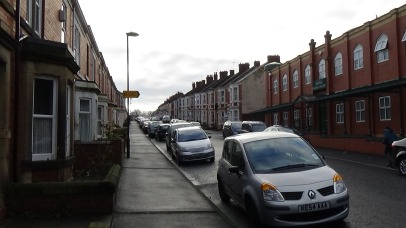 I try some more doors and there’s no takers. Quite a lot of middle-aged, Asian men answer. I ask one man if he has a minute and he says ‘Noooo,’ in a tone that sounds like I’ve asked if I can borrow his underpants. Soon after this, a Caucasian guy in a hoody opens the door. He seems really pissed off.
I try some more doors and there’s no takers. Quite a lot of middle-aged, Asian men answer. I ask one man if he has a minute and he says ‘Noooo,’ in a tone that sounds like I’ve asked if I can borrow his underpants. Soon after this, a Caucasian guy in a hoody opens the door. He seems really pissed off.
“What do you want?” he says, in a Manc drawl,* while rubbing his eyes.
“I’m doing an art project, have you got a minute?”
“Yeah go on then.” I start doing the poem and he stops me straight away. “Man, you know what, right, you’ve obviously done that pitch a million times and you’re still managing to say it with some enthusiasm.” He doesn’t say this as a compliment, more like a threat.
–
I’m not really sure what to do next. He seems to think I’m some kind of salesman and he looks pretty irritated by the fact that I’m standing here. On the other hand, he hasn’t asked me to go, maybe I can win him over? I carry on with the poem. He picks up some post and goes through it. He turns his back on me and reads one of the letters.
“Are you busy?” I ask. “Cos I can go.”
“So what are you doing, you’re selling poems?” he says, in a way that sounds exhausted and annoyed in equal measures.
“No, I’m not selling anything. I’m just writing poems for people.”
“Oh, OK,” he says. “You want to come in?” I go inside the door. I follow him down the hallway and he turns right. I assume it’s a sitting room. But it’s not a sitting room, it’s a toilet and he’s having a wee in it. I move away awkwardly and wait in the hallway. “Sorry about that, mate,” he says, coughing. “That’s not the welcome I give all the guests.”
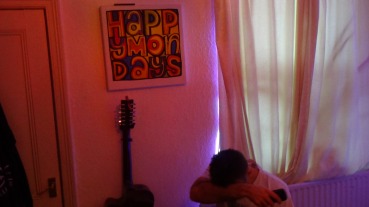 This is Nitram and I’ve just woke him up. “You’ve done well, man. To be honest, if someone wakes me up I usually slam the door and go back to sleep.” He leads me into a dark sitting room decorated with Stone Roses and Happy Mondays posters. I look down at the table in the middle of the room, there’s a tray with some tobacco and smoke on it. “Make one if you want,” he says. My name is Rowan McCabe and I’ve accidentally stepped into 1989. “You want a cup of coffee?” he asks.
This is Nitram and I’ve just woke him up. “You’ve done well, man. To be honest, if someone wakes me up I usually slam the door and go back to sleep.” He leads me into a dark sitting room decorated with Stone Roses and Happy Mondays posters. I look down at the table in the middle of the room, there’s a tray with some tobacco and smoke on it. “Make one if you want,” he says. My name is Rowan McCabe and I’ve accidentally stepped into 1989. “You want a cup of coffee?” he asks.
“Yeah, please.”
“I’ll probably make more sense once I’ve had a cup of coffee. I’m really run down at the minute.”
“There’s a lot of stuff going around, isn’t there?” I say.
“I’m not ill,” he replies.
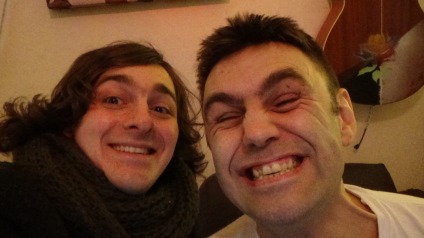 I sit down on the sofa. Nitram comes into the sitting room with coffee and we start talking about what’s important. “This might be interesting,” he says, taking out what looks like a very thick metal lighter. “I carry a camera on my bike. You go out on a bike late at night, all sorts of shit happens.” He laughs. He plugs the camera into a laptop and opens a file from about 1 in the morning. “Last night I was coming home from my mate’s house. Once again, the police decided to show an interest in me cos I wear a big pair of gloves and a hood.” He tells me it happens all the time, so he’s started filming it.
I sit down on the sofa. Nitram comes into the sitting room with coffee and we start talking about what’s important. “This might be interesting,” he says, taking out what looks like a very thick metal lighter. “I carry a camera on my bike. You go out on a bike late at night, all sorts of shit happens.” He laughs. He plugs the camera into a laptop and opens a file from about 1 in the morning. “Last night I was coming home from my mate’s house. Once again, the police decided to show an interest in me cos I wear a big pair of gloves and a hood.” He tells me it happens all the time, so he’s started filming it.
We watch the whole scene from the bike’s handlebars. Nitram waits at some red lights, the police car does as well. “If I had rode on the cycle path into Heaton Park now, they would have thought I was doing a runner and been waiting for me on the other side. It’s happened before.” Instead, Nitram pulls over on the footpath; a policeman gets out of a car shortly after and starts asking for his details. Nitram asks what he’s done wrong. “We’ve never seen you before,” says the officer; he says there’s been a burglary in the area, that they’re stopping anyone who comes past. Nitram still thinks it’s because of what he’s wearing. I’m inclined to agree, I once had my details taken in Heaton because I had ‘big boots’ on. The PC talks for a long time about how people like to see that they’re doing something in the area, how it makes them feel safer.
“Am I under arrest,” Nitram asks calmly.
“No,” says the officer.
“Am I free to go?”
“No.”
“So if I try to make my way home now, I’ll be arrested?”
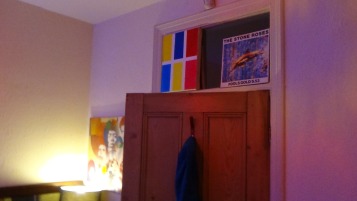 We talk about how this is unfair but, more importantly, how Nitram feels it doesn’t really get to the root of the problem. “The burglars start coming out at about 3 o’ clock,” he explains. “You see them going up the street, checking every car, every door handle, just for that one in a hundred that’s open. I’ve seen them do it, it’s horrible. They call it a ‘preventative measure’, having a highly visible pair of coppers in a highly visible car. The police think it stops the crime, but they’ve just driven it into another area. I said to them: ‘You want to catch these kinds of people, you should get on a bike in plain clothes like I am.’ It’s like giving a fox a glow in the dark Rudolf nose and expecting rabbits not to see it.”
We talk about how this is unfair but, more importantly, how Nitram feels it doesn’t really get to the root of the problem. “The burglars start coming out at about 3 o’ clock,” he explains. “You see them going up the street, checking every car, every door handle, just for that one in a hundred that’s open. I’ve seen them do it, it’s horrible. They call it a ‘preventative measure’, having a highly visible pair of coppers in a highly visible car. The police think it stops the crime, but they’ve just driven it into another area. I said to them: ‘You want to catch these kinds of people, you should get on a bike in plain clothes like I am.’ It’s like giving a fox a glow in the dark Rudolf nose and expecting rabbits not to see it.”
“I think there’s a poem in there,” I say.
“There’s lots of words that rhyme,” Nitram replies, with Zen timing.
He seems to always have a camera to hand in the most insane situations. He clicks on another bit of footage while he rolls a smoke. It’s at the front door of his friend’s flat in Walker; a stranger is outside with no shirt on, waving a machete around for no reason. Every now and again the door is opened to try and calm down the man, before being slammed and locked when he makes a sudden movement with the blade. We chat for a bit longer. I tell him I’ve got to go, it’s been nearly an hour. “I know a guy down the road, I’ll text him and tell him to talk to the Door-to-Door Poet,” he says.
–
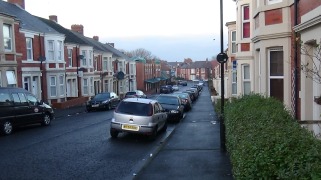 I step out into the light. I’m feeling a bit dazed. I haven’t smoked anything but I’m wondering if the smog could have had an effect. After a few more doors, an old man with a grey jumper and a white topi answers. His name is Sami. I ask him what’s important.
I step out into the light. I’m feeling a bit dazed. I haven’t smoked anything but I’m wondering if the smog could have had an effect. After a few more doors, an old man with a grey jumper and a white topi answers. His name is Sami. I ask him what’s important.
“Everything.”
“Everything in the universe?” I ask.
“Yes.”
“I could write you a poem about the whole universe,” I say. However, suddenly terrified by my own ambition, I decide it might be better to choose something a bit more specific.
“What gets you out of bed in the morning?”
“God, god is everything,” Sami says. He tells me he’s a Muslim.
“I could write you a poem about Islam,” I suggest. “But I don’t know very much about it.”
“There is a mosque across the road,” he says, pointing from the door. “They would tell you everything you need to know.”
“I could write you a poem about the mosque.”
“Yes,” he nods, smiling. Wajid already suggested I give the mosque a knock, so this seems like a great idea. Plus, I’ve never been into one before and I’ve kind of always wanted to. I’m a committed agnostic, but I do take a healthy interest in what other people believe in. I get a picture with Sami and his granddaughter, who comes toddling down the stairs right at the last moment.
“Hello!” I say. “I’m going to write a poem for your Granda!” She smiles and waves.
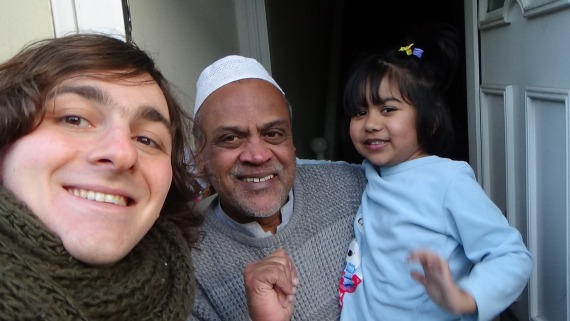
After this, I don’t have any takers for quite a while. I start to think about what Nitram said to me before I left his house:
“All the husbands will be at work and the wifes aren’t allowed to answer the door.” It’s something I’ve been told before. But what’s interesting is that a lot of women are now answering the doors. About 4 of them do this as I move slowly down the street. Some of them politely say no, some tell me they don’t speak English, so I give them a wave and carry on. At one point, I meet a woman in a red sari and tell her I’m doing an art project. She invites me in. I step into the hall and she points to the gas meter.
“Oh, no. I’m a poet,” I say.
“Sorry?”
“I write poems for people.”
“Sorry…?”
“Poetry.”
“I have little English,” she says. She points to the meter again. I wish I could show her my clever joke about not being here to check the meter, but I don’t think it’s going to work right now.
“No meter,” I say.
“School?” she asks.
“No, no school.” I think desperately for a way to explain but I can’t. It’s a shame, she seems really nice. But I don’t think I can find out what’s important to her if we don’t share a language. I say thanks and give her a card.
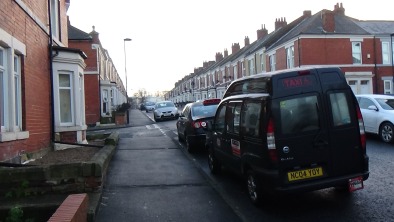 In general, I’m finding that judging the best level of English to go in with is pretty difficult. A person will answer the door and I will ask if they have a minute to spare; based on their reaction, I make a snap decision on whether to launch into a whole poem, to give a short, basic version, or to simply say “I’m a poet” and see where that takes me. I think, more often than not, I make the wrong choice. As I carry on, a man sticks his head out of an upstairs window and asks what it’s all about. I perform the whole poem for him in the street below, as if he’s on a balcony in the extremely elaborate set of a play. I realise this is probably the closest I’ll get to playing Romeo. He laughs at certain bits and nods along, he seems to really enjoy it.
In general, I’m finding that judging the best level of English to go in with is pretty difficult. A person will answer the door and I will ask if they have a minute to spare; based on their reaction, I make a snap decision on whether to launch into a whole poem, to give a short, basic version, or to simply say “I’m a poet” and see where that takes me. I think, more often than not, I make the wrong choice. As I carry on, a man sticks his head out of an upstairs window and asks what it’s all about. I perform the whole poem for him in the street below, as if he’s on a balcony in the extremely elaborate set of a play. I realise this is probably the closest I’ll get to playing Romeo. He laughs at certain bits and nods along, he seems to really enjoy it.
“I know a lot of people don’t think poetry’s relevant,” I say. “So I’m asking people what’s important to them.” However, as I wait for his response, I can see his English isn’t quite as good as I first thought.
“I don’t understand,” he says. “Try next door, their English better.”
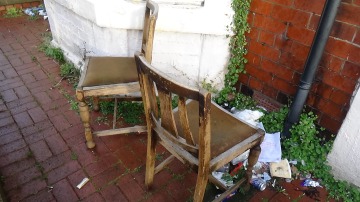 Eventually, I get to a house with two wooden chairs outside. A lad about the same age as me answers in tracky bottoms. He’s called Corey and, this time, I’m pretty sure he speaks English. I ask him about the chairs. “There’s a barber at the top of the street,” he says, in purely, full-on Geordie. “We know him quite well. He comes down and we have a civilised drink outside.”
Eventually, I get to a house with two wooden chairs outside. A lad about the same age as me answers in tracky bottoms. He’s called Corey and, this time, I’m pretty sure he speaks English. I ask him about the chairs. “There’s a barber at the top of the street,” he says, in purely, full-on Geordie. “We know him quite well. He comes down and we have a civilised drink outside.”
“Out here on the chairs?” I ask
“Well not lately,” he says, gesturing to the soggy seats and the freezing weather.
“Was he your barber first, or your friend?”
“I used to go down all the time and get my hair cut. We got on really well and became friends.” I ask how good the barbershop is. He says it’s excellent. “The kids came out of school yesterday, my fiancée went and asked if they could cut their hair; this was at 3 o’ clock, it was jam packed. She went back again at 6 o’ clock, still jam packed. Went back at quarter past 7, it was still jam packed. It didn’t close till 8 o’ clock! If there’s a religious celebration, you’ll know about it cos there’ll be queues out the door.” I tell him that sounds like quite the barbers. I offer to write a poem about it. “I’m excited about this!” says Corey. “I think it’s quite cool what you’re doing.” To be honest, I wasn’t expecting him to be this enthusiastic. “If you bring me a printed copy of that poem, I’ll show it to everyone I know,” he says with pride. I honestly wouldn’t prefer to do any other job in the world.
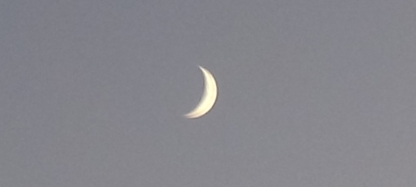 It’s now pitch black and very cold. I’m wrapped up in a massive scarf and jacket but it doesn’t seem to make a difference. I stop to take a picture of the very thin moon in the sky; it looks like the Islamic crescent. An old man with a white moustache and an orange topi comes past.
It’s now pitch black and very cold. I’m wrapped up in a massive scarf and jacket but it doesn’t seem to make a difference. I stop to take a picture of the very thin moon in the sky; it looks like the Islamic crescent. An old man with a white moustache and an orange topi comes past.
“Are you taking a picture of the moon?” he asks.
“Yeah, it’s beautiful isn’t it?”
“Yes,” he says. “And the clouds underneath it too. You should send it to BBC weather watchers.” I get to the end of the street. I decide to cross over and work my way back down. A woman opens a very fancy looking white door, with two flower pots hanging either side.
“Hi, I’m doing an art project.”
“Sorry, I’m about to go out,” she says, in an amazing Geordie/Asian accent. I try the house next door but, as I’m waiting, the woman I just spoke to comes out the house and walks over to me. “My son is doing art at college. You might want to speak to him?” I explain that it’s poetry but she doesn’t seem to mind.
I go back and meet the 18 year old Salman at the door. He’s in a t-shirt and stands dutifully shivering while he listens to my poem. I can feel the heat from inside pouring out. His mam listens from the stairs behind him. “Do you want to come in?” she says, smiling. I tell her I’m sorry for letting the heat out and take my boots off at the door. While I’m doing this, Salman’s mam comes past on her way out. “You can sit in the sitting room and talk,” she says. “His dad is upstairs if you need him.” I head into a very posh-looking cream sitting room with brown leather sofas and a tank filled with exotic fish.
“I like your fish,” I say to Salman, as I sit down.
“They’re my Dad’s,” he says. I ask him what’s important. “Lots of things. Fashion, skating, music.”
“Tell me what kind of fashion you like,” I ask.
“Things that people don’t normally agree with. Ripped clothes.” We talk about how fashion goes around, how torn jeans were in when I was younger before they went out again; how my parents tried to tell me it had been done before. Now I feel like that person, the person who says: ‘We did that years ago’. Despite this, it seems to get a bit more extreme every time. I ask him if sometimes jeans can be too torn. “Yeah, when the whole leg is sticking out,” he says.
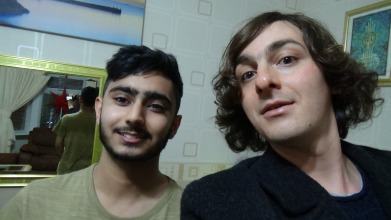 Salman’s favourite music is rap. “I like Dre but I love Tupac as well. They both changed the world.” He tells me he thinks the new generation are better though. It’s controversial. “They’re just more advanced,” he says. “You can’t live in the past, you’ve got to move with the times. When people make music now, there’s not a specific genre. It’s so diverse.” I think this is a really interesting point. We talk about how the internet has played a big part in this, how people can listen to any kind of music they want.
Salman’s favourite music is rap. “I like Dre but I love Tupac as well. They both changed the world.” He tells me he thinks the new generation are better though. It’s controversial. “They’re just more advanced,” he says. “You can’t live in the past, you’ve got to move with the times. When people make music now, there’s not a specific genre. It’s so diverse.” I think this is a really interesting point. We talk about how the internet has played a big part in this, how people can listen to any kind of music they want.
“Do you think there’ll be genres in the future?” I ask.
“No,” he says. “There’ll be so many different noises you can make, I don’t think they’ll be able to limit them down to different genres.”
“What would you call it though?”
“It would all just be music,” he says. Deciding to either write something about torn jeans or the music of the future, I think it’s time to go home. I say my goodbyes to Salman and head out into the dark.
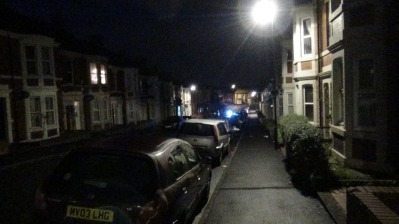 I walk to the bus stop. I’m pleased with how incredibly well it’s went today. Everyone I met was up for being on the radio and I’ve chatted to people about everything from Islam to Hip hop. I feel like it’s really reflected the different kinds of people you can find in a migrant community. The whole day has also challenged a few things I’d been told beforehand as well. I was worried no one would even answer the door but, compared to Heaton, the success rate was actually better. I was told twice that the women here wouldn’t speak to me. But Salman’s mam actually came down the street to get me and, if she wasn’t on her way out, I think she’d have really liked a poem too. In fact, lots of women I met came to the door, one even invited me in the house despite having no idea who I was or what I was saying. It’s true that some of them might not have been able to answer for religious reasons, but that doesn’t mean it’s true for everyone. The more I do Door-to-Dooring in unfamiliar places, the more I become aware of how we tar everyone in certain areas with the same brush. ‘Those lot over there will all do this.’ ‘These lot will all say that.’ I don’t know where these ideas come from, but they’re often not true. I think if we all looked a little bit closer, we’d be surprised at the different people we can find.
I walk to the bus stop. I’m pleased with how incredibly well it’s went today. Everyone I met was up for being on the radio and I’ve chatted to people about everything from Islam to Hip hop. I feel like it’s really reflected the different kinds of people you can find in a migrant community. The whole day has also challenged a few things I’d been told beforehand as well. I was worried no one would even answer the door but, compared to Heaton, the success rate was actually better. I was told twice that the women here wouldn’t speak to me. But Salman’s mam actually came down the street to get me and, if she wasn’t on her way out, I think she’d have really liked a poem too. In fact, lots of women I met came to the door, one even invited me in the house despite having no idea who I was or what I was saying. It’s true that some of them might not have been able to answer for religious reasons, but that doesn’t mean it’s true for everyone. The more I do Door-to-Dooring in unfamiliar places, the more I become aware of how we tar everyone in certain areas with the same brush. ‘Those lot over there will all do this.’ ‘These lot will all say that.’ I don’t know where these ideas come from, but they’re often not true. I think if we all looked a little bit closer, we’d be surprised at the different people we can find.
*I’m a Door-to-Door Poet,
my hair could be much neater
but, this could be worse,
I could be here to check your meter.
Tell me about your life,
maybe not the whole of it;
I’ll put it in a poem for you
or have a decent go at it.
Thanks for listening to these verses,
I hope I got across my purpose.
Don’t slam the door, don’t be nervous,
the Door-to-Door Poet is at your service.
* Nitram contacted me later to say he is actually from Cheshire and not Manchester.
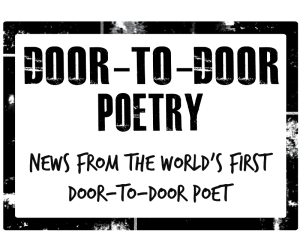
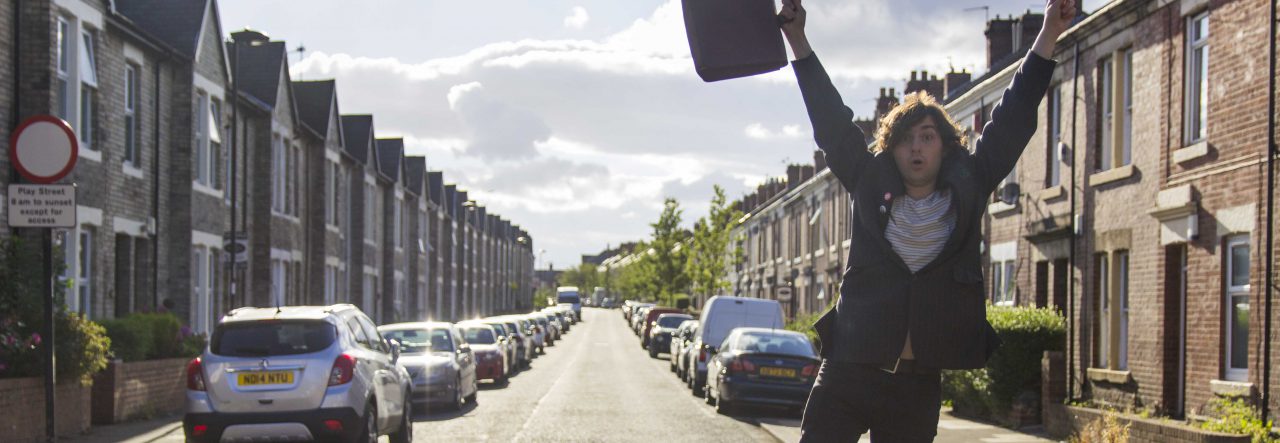
Re: Nitram and the police. Not sure about English law, but in Canada, if you are not free to go then you are under arrest. To arrest means to stop. So, in Canada – and I suspect Britain, Nitram was either under arrest or free to go. There is no in-between.
LikeLiked by 1 person
Re: Nitram and the police. Not sure about English law, but in Canada, if you are not free to go then you are under arrest. To arrest means to stop. So, in Canada – and I suspect Britain, Nitram was either under arrest or free to go. There is no in-between.
LikeLiked by 1 person
Reblogged this on Guerrilla Writing and commented:
Guerilla writing at its best!
LikeLiked by 1 person
Hi Rowan,
This is brilliant!
Made my afternoon. I am going to spread the word.
Thanks!
LikeLike
Pingback: The Mosque and Sab’s Barbers – Door-to-Door Poetry
Hi. Just heard you on the Steve Wright show. We’re a narrow boating community near the Anderton Boat Lift outside Northwich in Cheshire. We live on our boat in a beautiful part of the countryside and would love you to come and visit!
LikeLike